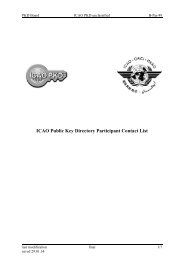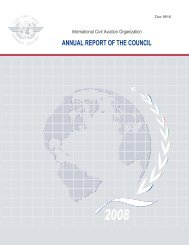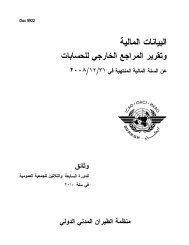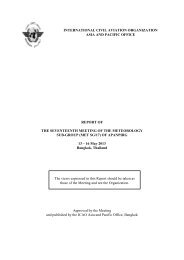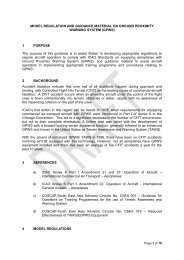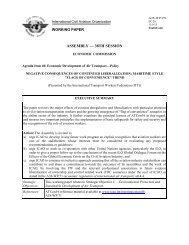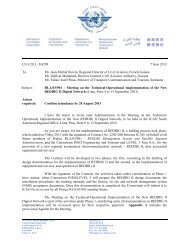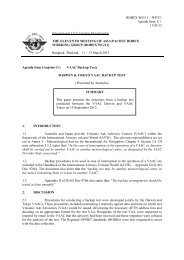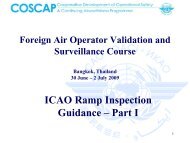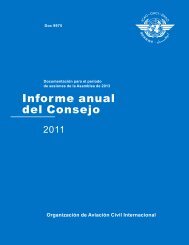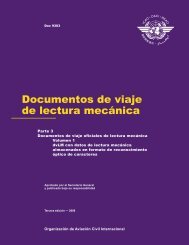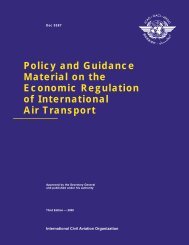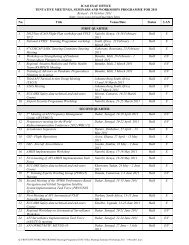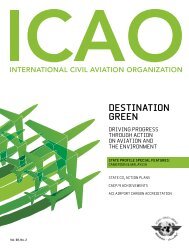Joint Western & Central African (WACAF) Office and - ICAO
Joint Western & Central African (WACAF) Office and - ICAO
Joint Western & Central African (WACAF) Office and - ICAO
Create successful ePaper yourself
Turn your PDF publications into a flip-book with our unique Google optimized e-Paper software.
STATE PROFILE — NIGERIA<br />
3-D total body imaging scanners recently installed at the Murtala Muhammed International<br />
Airport in Lagos.<br />
One of Nigeria’s more pressing aviation challenges has been<br />
achieving the coveted Category One status from the U.S.<br />
Federal Aviation Administration (FAA). The FAA’s Category<br />
One designation, part of their International Aviation Safety<br />
Assessment (IASA), permits State carriers to operate direct<br />
flights to the United States. The process normally takes five<br />
years but NCAA diligently worked to fast-track its application<br />
to achieve the required status in a shorter time. After almost<br />
four years, on 24 August 2010, Nigeria attained FAA IASA<br />
Category One status. Demuren congratulated all <strong>and</strong> said<br />
he was proud that Nigeria did not cut corners <strong>and</strong> that the<br />
main challenge going forward is to maintain the Category<br />
One status. He could foresee many positive benefits as a<br />
result of the overall process.<br />
“This is not just about Category One status, but the<br />
achievement of a robust system that will serve Nigeria<br />
<strong>and</strong> the West <strong>African</strong> sub-region for a long time to come,”<br />
Demeuren remarked.<br />
Meanwhile, one of Nigeria’s designated carriers, Arik Air,<br />
has already begun direct flights between Lagos <strong>and</strong> New York<br />
under an arrangement whereby the carrier wet-leases its<br />
aircraft from Portugal, a Category One rated country. In the<br />
meantime, the NCAA continues to coordinate with other<br />
parastatals, notably the Federal Airports Authority of Nigeria<br />
(FAAN) <strong>and</strong> the Nigerian Airspace Management Agency<br />
(NAMA), to ensure a cohesive approach to all aspects<br />
of aviation safety.<br />
16 REGIONAL REpORt - AFRICA - 2011<br />
Nigeria’s Airports: Evolving to<br />
meet 21 st Century Regional<br />
<strong>and</strong> International Challenges<br />
The Federal Airports Authority of Nigeria<br />
(FAAN), a member of the Airports Council<br />
International (ACI), manages all of the<br />
commercial airports in Nigeria, providing<br />
the necessary maintenance <strong>and</strong> services<br />
for air transport in the country. The<br />
FAAN’s management recently ordered<br />
an infrastructure audit on all airport<br />
facilities across the country <strong>and</strong>, based<br />
on its results, was able to prioritize the<br />
considerable issues requiring attention.<br />
The audit revealed several issues<br />
requiring urgent attention, namely:<br />
airfield lighting systems; firefighting<br />
equipment; <strong>and</strong> the state <strong>and</strong> strength<br />
of State runways.<br />
“We have now completely rehabilitated<br />
the Port -Harcourt International Airport<br />
runway, including the airfield lighting,”<br />
stressed George Uriesi, Managing Director of the FAAN.<br />
“This was a massive challenge, but we are now very pleased<br />
to report that the re-opening of the airport has contributed<br />
very positively to the benefit of the Niger Delta region.”<br />
Despite the urgency of this work, FAAN has also begun<br />
addressing an issue of even greater importance: the cus-<br />
tomer service skills of its employees. Some 47 percent of<br />
the FAAN workforce was sent on various training programmes,<br />
either locally or abroad in the last 15 months.<br />
Despite the current administration’s commitment to upgrading<br />
State airports, there are limits to the funds available. With<br />
20 airports in the country <strong>and</strong> a 12 month time frame to<br />
rebuild a runway, Nigeria would only finish its last runway<br />
Nigeria’s former Minister of Aviation, Fidelia Njeze, waves the FAA IASA<br />
Category 1 certificate as U.S. Ambassador Robin S<strong>and</strong>ers <strong>and</strong> NCAA<br />
Director General Harold Demuren applaud this important accomplishment.



